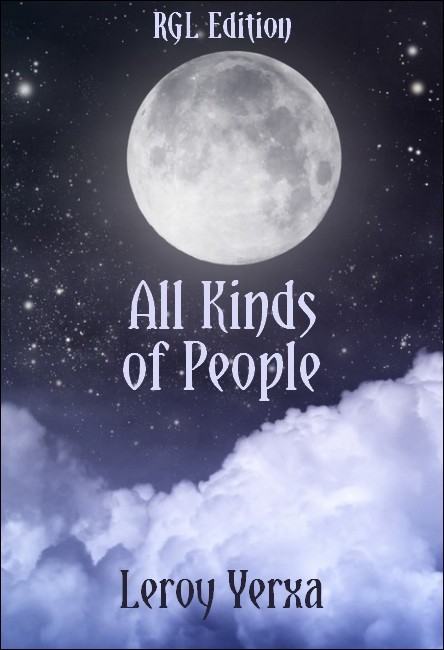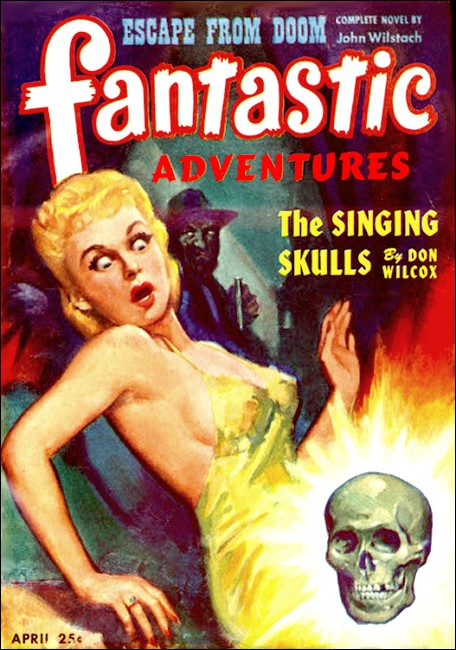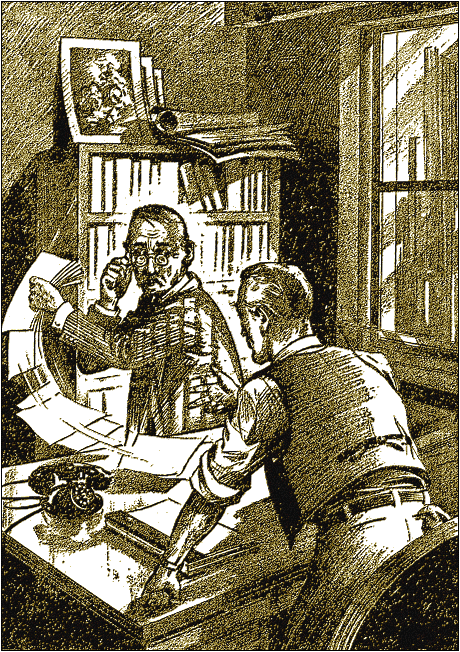
RGL e-Book Cover 2018©

RGL e-Book Cover 2018©

Fantastic Adventures, April 1945 with "All Kinds of People"
MR. FLITT had a story he'd written... "Illogical?
Oh no! You're wrong about that, Mr. Editor!"

"I'm afraid it's impossible," he said. "I just can't revise the manuscript."
SAMUEL S. BLACK stopped reading the script through which he had been proceeding at leisurely pace, and reached for the phone.
"Yes! What is it?"
Tillie Compton, the switchboard girl for Black-Publications, Incorporated answered in what was meant to be a fresh young voice:
"A Mr. Flitt to see you, Mr. Black." This was all very formal on Tillie's part, because usually she called Samuel S. Black by his nickname. "Pinky" and even sat on his knee if the occasion seemed to demand it.
"Flitt—Flitt? Do we know anyone named Flitt?"
He heard Tillie sigh. Samuel S. Black's memory was dulled at times by the reams of "slush" he was forced to wade through to locate a presentable story for Horrible Tales.
Tillie's voice was gentle but flavored with a tinge of sarcasm.
"You have encouraged Mr. Flitt to submit material to our magazine."
Samuel Black knew that Mr. Flitt must be listening to Tillie's end of the conversation because Tillie carefully referred to the book by its full title and continued to use her best guest manners. Though still unable to remember Mr. Flitt, Black back-watered hastily.
"Oh yes, yes of course. Send Mr. Flitt in at once."
He discarded the phone as though it Were a distasteful thing. He sat back, felt the sun on his back and it reminded him that the small office was very warm. He wiped the perspiration from his forehead with a hairy arm.
"Now who in blazes is Flitt?" he asked himself and searched his mind for an answer.
Suddenly he had it. Roscoe Flitt was the full name; and as Samuel Black remembered, his neck turned the color of baby pink and he swore softly. He had first met Mr. Flitt on the Ridge bus. That gentleman had been engaged in reading Horrible Tales through incredibly thick-lensed spectacles? The specs plus the fact that he had found someone reading his magazine had fascinated Mr. Black. Although the circulation department showed fifty thousand copies of Horrible Tales on the "sold" side of the records, this was the first time a reader had been caught in. the act, as it were, of actually devouring the contents.
A conversation had been born, with a very unfortunate result for Mr. Black; Mr. Flitt felt that he had a message for the readers of Samuel S. Black's splendid little magazine.
A relationship had thereafter grown between them which Samuel Black tried at every opportunity to discourage. He had sent ten of Mr. Flitt's efforts back to him neatly enveloped and marked, "Not for Us! " Now Mr. Flitt was trying again. This time he had come in person.
THE sound of footsteps came from outside the door and a nervous hand was
placed upon the. doorknob. Before his guest could.enter, Mr. Black shouted a
hurried: "Come in."
This authorized an entrance which was going to take place anyway, and Black felt better for having stamped his approval on the act.
Mr. Flitt came in. He was a small gentleman with sloppy gray hat and a gray suit that had been cleansed partially of many contacts with soup and eggs. Mr. Flitt had a very thin face and an adam's-apple that seemed to do about as it pleased. He walked to the desk and tendered his manuscript, wrapped as usual in brown paper from the corner butcher shop. He also offered his hand. It was a frail, very white hand, and Samuel Black dropped it as soon as he could do so without appearing finicky.
"I've—I've tried again," Mr. Flitt said in a voice worn threadbare by long use. "I think this—might be nearer what you want."
It was evident that he expected an immediate examination of the atrocity wrapped in butcher's paper, for he sat down primly on the edge of the visitor's chair, removed his hat and started to play with the creases in it. Mr. Black spoke a few words on the subject of how glad he was to see Mr. Flitt and asked if he had mastered the task of putting "living breathing characters" into his fiction. .
Mr. Flitt thought he had. Yes, in fact he was sure that he had done so. This left nothing for Mr. Black to do but unwrap the script, to study it hurriedly, make sure it had sentences and that it was written in the accepted English language. It met these simple requirements, so Mr. Black started to read.
For perhaps three minutes Mr. Black continued to scan the story, working from page one through seven. There the pink bloom of his neck darkened a shade, and he stopped reading. This was far enough. He had made an effort. He had a right to stop when he wished. Who did Flitt think he was? He couldn't force ...
"I hope it suits your needs," Mr. Flitt said, evidently having read a writer's magazine to find the correct method of approaching the editor.
Mr. Black sighed. He looked very sorry. He was, but not for Mr. Flitt.
"I'm disappointed," he said gently. "The characters aren't realistic or plausible."
Mr. Flitt seemed distressed. However, he said nothing and this left Samuel S. Black on the spot. He sat back, replaced the pages in their proper order and took a long breath.
"I take it that this is a story about a man who finds that by pressing a certain nerve behind his right ear, he can disappear entirely from sight; and materializes once more by repeating the process."
Mr. Flitt nodded gravely.
"You have captured the mood of the thing entirely," he admitted. "I worked very hard to produce something your readers would appreciate."
MR. BLACK sat in silent contemplation for some time. He stared out the
window across town toward the cool blue sweep of Lake Michigan. He dreamed of
a boat that would take him far away from people like Mr. Flitt.
He dreamed so vividly that when he came once more to his senses it gave him quite a start to see that Mr. Flitt was still present.
He had nothing to say, but had to say something. He would use the old line again. It would do ho good, but. it would get rid of Mr. Flitt and at this moment, that was most desirable.
"I must repeat," he said sternly, "that your stories must contain characters in whom one can believe. New ideas—new situations. The idea of becoming invisible is very old. It has been published a thousand times. Not even the method is new. In fact, I seem to recall a comic strip based upon the same idea."
Mr. Flitt nodded eagerly.
"I realize that," he said, "but I worked very hard to tell a story about people like the ones who live next door. People who eat, sleep and act as you and I. For that reason, when the disappearance of my hero occurs, so suddenly, it creates a shock that will surely carry through to a convincing climax."
Mr. Flitt knew all the rules. He knew them because Samuel Black had repealed them for him a hundred times. Mr. Flitt was a splendid student, so far as learning words was concerned. Samuel Black scratched his nose again and wondered what he could say. Mr. Flitt just didn't know enough to leave impossible situations alone.
"I can believe every character in the story with the exception of your hero, Mr. Frozzy," he admitted. "Mr. Frozzy is a dilapidated, unconventional person from the first. He goes around getting himself into trouble until it seems impossible for him to escape death. Then, by pressing this—this nerve behind his ear, he escapes and solves everything. I tell you, Mr. Flitt, it's not the way to write a story."
Mr. Flitt arose slowly, turning his hat in his hands and clearing his throat as little men do when they feel like crying and don't dare to because they weren't brought up that way.
"Then I'm to understand that you don't wish to purchase my effort?"
Samuel Black nodded ever so slightly never taking his eyes from Mr. Flitt's narrow, disappointed little face.
"Unless you take out that antiquated business of pressing the nerve, and give your character Mr. Frozzy a more logical manner, of reaching his end, I'm afraid I can't accept the story."
Mr. Flitt seemed to go into conference with himself. He made queer noises in his throat. He placed his hat upon his head, removed it with nervous fingers and placed it on his head again. Color mounted to his cheeks and changed them from dead gray to a mild tone of brown. Then he seemingly reached a decision. ,
"I can't change Mr. Frozzy's habits," he said firmly. "Mr. Frozzy acts as any one would under the circumstances. He'll have to remain as he is."
This gave Samuel Black the opportunity he had been praying for.
"Then," he said, and passed the script to Mr. Flitt, "I'm afraid I have no choice. I can't buy the story."
There was no mistaking the look of genuine disgust that flashed into Mr. Flitt's pale eyes.
"Very well," he snapped, and snatched the script with both hands.
He backed a few steps away from the desk; pressed a bony finger into a spot behind the lobe of his right ear, and vanished.